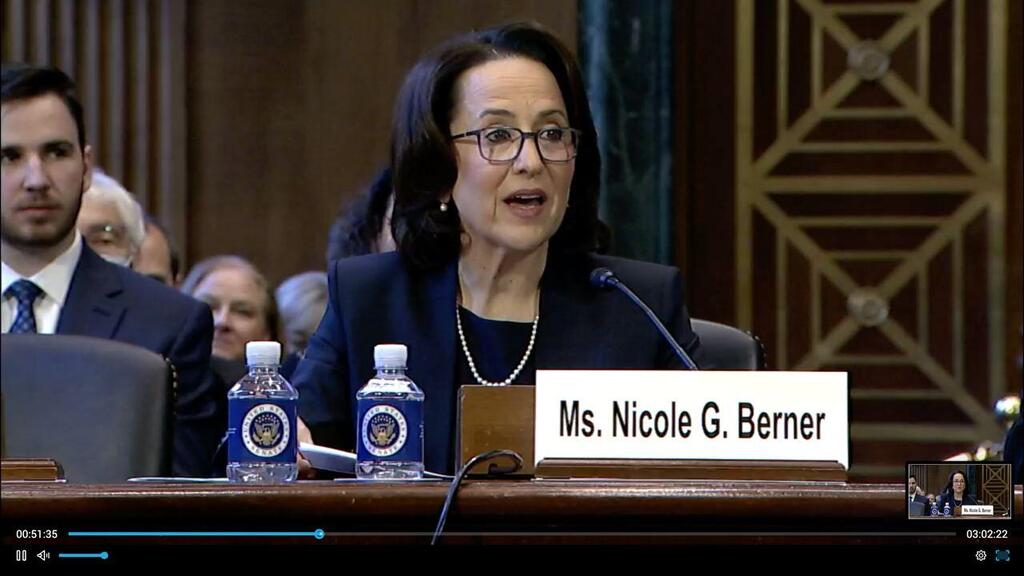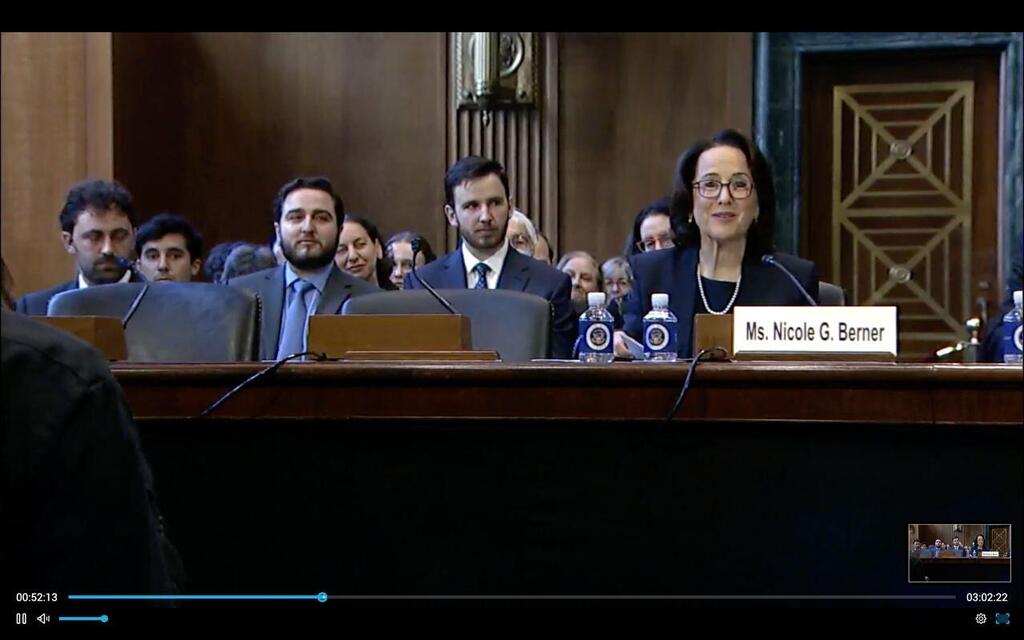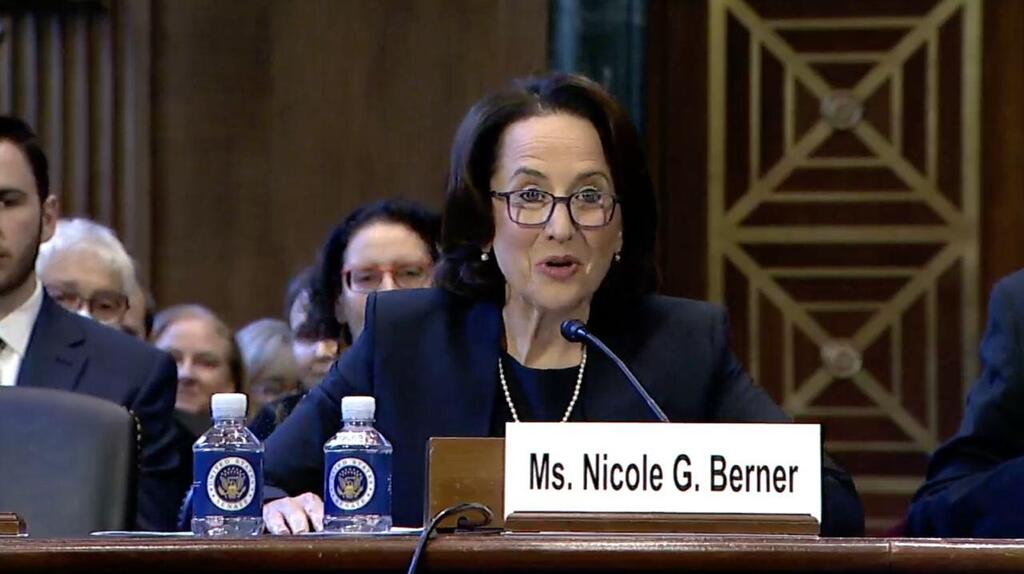Getting your Trinity Audio player ready...
In an unprecedented nomination, U.S President Joe Biden nominates LGBTQ Israeli lawyer, Nicole Berner to be a federal judge in the United States Court of Appeals for the Fourth Circuit. In the coming months, the President's eight federal judge nominees are expected to take office.
Read more:
Berner, an LGBTQ activist who is on her way to preside over one of the most prestigious courts in the U.S already made history when she appealed to the Israeli High Court of Justice to be recognized as the mother of the children born into her family with her then-partner Ruti Kadish.
The American-Israeli is expected to be seated in a court with jurisdiction over the states of Virginia, West Virginia, Maryland, North Carolina and South Carolina. In the past, this court was one of the most conservative appeals courts in the U.S, but since the Obama administration, it has actually become one of the most liberal courts with groundbreaking rulings on transgender rights and gun restrictions. The liberal Berner will fit the court like a glove.
Berner was born in 1965 in England, and as a child her family moved to Oakland, California where she completed her B.A in Women's Studies at the UC Berkeley. After spending one semester at the University of Haifa, she decided to move to Israel after completing her degree.
She had said in past interviews that in Israel she developed her true passion for promoting the values of democracy and women's rights and still serves as a member of the advisory board of the Association for Civil Rights in Israel.
In 1990, Berner founded the "Bat Adam" organization in Tel Aviv, which focused on promoting the rights of victims of sexual assault and domestic violence, and in her advocacy work met another Berkley alumna, Ruti Kadish and the two married in 1994. Berner said the local newspaper refused to print the wedding ad, and suggested calling the event a "commitment ceremony". The couple refused. "We didn't have any commitment ceremony, we had a wedding," Berner said. "It just shocked me that we had to push the limits of journalism." In January 1996, Ruti gave birth to their child, Matan.
"We wanted to have a child together. The decision over which of us would be carry the pregnancy was based on who could take time off from school and work," said Berner. The state of California approved Berner's status as Matan's mother without problem, but when the couple began to consider returning to Israel, their request to have their parental rights recognized was refused by Israeli consulate in San Francisco. "The people at the consulate were really nice, and felt terrible that Israel would not acknowledge that we were both the parents," Brener said.
The family returned to Israel where Brener worked as a lawyer and in November 1998 she gave birth to their second son, Naveh. She then appealed to the Supreme Court through the Civil Rights Association, so that her parental rights would extend to the couple's first born, in Israel.
The justices Dalia Dorner and Dorit Beinisch, were in favor of Brener's request but justice Abdel Rahman Zuabi opposed it. "There were two women and a man presiding," Berner said at the time. "I don't know if it was just a weird coincidence, but in the three-judge panel, the women supported us and the man didn't. All this while our case was incredibly strong. Your family status goes with you wherever you are in the world. You can't be a parent to a child in one country and not a parent in another."
As expected, the verdict was criticized by religious Knesset Members, who said it was a "affront" to Jewish family values. For the couple, the verdict was only technical and shortly thereafter, the family returned to the U.S. where their third son, Segev, was born but was recognized as the son of two mothers in Israel in 2007, only after the Supreme Court reprimanded the Interior Ministry who initially refused.
Over the years the family lived between Maryland and Israel. "We feel at home in both places and we have a community in both places," Berner said. She and Kadish eventually divorced, and Berner worked her way up through the U.S federal court system. She clerked for senior judges who were considered pioneers in the field of human rights, such as Thelton Henderson and Betty Fletcher.
Braner later married Debra Katz, a civil rights attorney, and the couple now lives in Takoma Park in Maryland, where they are active members of the local synagogue.
Berner's appointment for life, must be approved by the Senate. Republicans, predictably, did not welcome the nomination of a lesbian judge, a passionate supporter of Planned Parenthood, labor unions and easing immigration policies. In a hearing earlier this month, Reublicans grilled Brenner and mentioned her criticism over the appointment of Justice Brett Kavanaugh a conservatice justice appointed by Trump to the U.S. Supreme Court.
Attorney Debra Katz, Berner's wife, represented Prof. Christine Blasey Ford, who accused Kavanaugh of sexual assault, and described to the Senate how he pinned her to a bed and groped her at a high school party.
"Despite the fact that multiple women have accused Kavanaugh of sexual assault, Senate Republicans have allowed only one woman to testify," Berner said in 2020. "They ignored or belittled the rest of the accusations," she added, noting that Republicans tried to pretend it was a "she said- he said," situation.
At the Senate hearing, the Republicans presented Berner with an ethical dilemma, which deals with her support for Israel, as well as LGBTQ rights. They asked her if she would support a baker who refuses a request to make a cake with the inscription "from the river to the sea" or with a bleeding Star of David, alluding to the Supreme Court's ruling that a baker cannot be forced to bake a wedding cake for an LGBTQ couple. Berner replied that she would support the baker.
With her partner and three sons behind her, Berner remained calm throughout the hearing. She was not moved by the questions, which were hostile at times, and by the end of the hearing, even the conservative critics agreed that she had succeeded in proving that she had a "judicial temperament".
Berner emphasized her Jewish and Israeli background, saying that she was "committed to the Jewish value of Tikun Olam" and "was inspired" to become a lawyer when she founded the "Bat Adam" organization in Israel.
At the hearing, she thanked the members of her extended family, "who came from Israel to be here with me today. They left their children and grandchildren in the middle of a terrible war to come and support me. I could not be more grateful for that."







